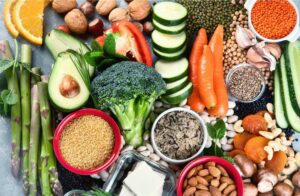What we eat provides our body with the energy, vitamins, and nutrients we need. Plus, did you know our brain uses 20% of our daily energy, so if we don’t consume healthy, nutritious fuel, our body and brain won’t be at its best. What we eat fuels our bodies for energy, growth and repair.
How the food we eat affects our mood?
Our Brain
Our brain has a region called the hippocampus. The hippocampus looks after our learning, memory, mood and mental health. This brain region can change in size, with studies showing people who suffer from depression having a smaller hippocampus. Foods rich in omega-3 and polyphenols affects the growth of our hippocampus, while a diet high in fat and sugar doesn’t allow our hippocampus to develop.
Our Gut
The digestive system is the machine for processing our food. Food is broken down by the digestive system to give energy to every cell in the body. Part of our digestive system is our gut bacteria. Growing evidence is shows gut bacteria regulates the neurotransmitter serotonin and the production support our brain cell growth. Serotonin helps regulate sleep, our appetite, inhibits pain and mediates mood, with changes in serotonin levels affecting your gut function well as your brain. Evidence shows the creation of serotonin is generated by a healthy happy gut environment, leading to better mood and sleep.
Food and our brain – polyphenols
Polyphenols are prebiotics that feeds our gut bacteria. By consuming polyphenols, our gut bacteria will work adequately and impact our serotonin levels. One food rich in in polyphenols is cocoa, for example chocolate. Chocolate is high in polyphenols called flavonoids that may assist in mood, such as negative mood states. Also, spices like turmeric have curcumin, are polyphenols that positively affects our mood regulation and increases serotonin levels.
Studies have also linked the probiotics strains Lactobacillus helveticus and Bifidobacterium longum assisting in the reduction of symptoms associated with anxiety and depression. Both probiotics are found in fermented foods, such as kefir, yoghurt, cheese, kimchi and sauerkraut. Check out this recipe for your dose of polyphenols:
Blueberry Breakfast Smoothie
Ingredients
½ cup frozen blueberries
1 cup fresh spinach
½ cup of ice cubes or cold water
½ cup of probiotic kefir
½ cup of reduced fat milk or alternative milk
1 tablespoon LSA (linseed, sunflower seed and almond meal)
½ teaspoon honey (optional)
Method
1. Put all the ingredients in a blender and blitz until completely smooth.
2. Enjoy at home or on the run.
Food and our brain – omega 3
Two omega-3 fatty acids — eicosapentaenoic acid (EPA) and docosahexaenoic acid (DHA) — are thought to have the most potential to benefit people with mood disorder.
The Australia Dietary Guideline recommends fish, especially oily fish such as salmon and tuna, can be a valuable source of essential omega-3 fatty acids. Small quantities of these fatty acids are also found in lean grass-fed red meat, poultry and some eggs.
Although omega-3s are generally safe and well tolerated, further research is needed to determine how effective they really are and long-term safety before conclusive recommendations can be made.
References
https://www.health.harvard.edu/blog/nutritional-psychiatry-your-brain-on-food-201511168626
https://foodandmoodcentre.com.au/2021/04/looking-through-the-lens-at-how-food-can-improve-our-mood/
https://foodandmoodcentre.com.au/2017/10/polyphenols-do-we-all-just-need-a-little-more-chocolate/
https://foodandmoodcentre.com.au/2018/06/fermented-foods-functional-foods/
https://www.health.harvard.edu/blog/omega-3-fatty-acids-for-mood-disorders-2018080314414





